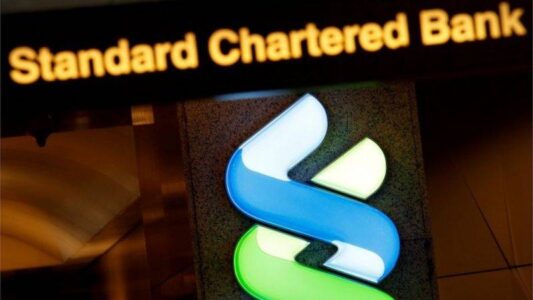
FinCEN Files claim that British bank moved money that may have been linked to terrorist financing
A British bank moved money that may have been linked to terrorist financing, leaked documents show. Standard Chartered Bank processed almost $12m (£9.4m) in payments for Jordan’s Arab Bank from 2014 to 2016.
In 2016, Standard Chartered filed a report alerting authorities to more than 900 transactions that it suspected might have been for “illicit activities under the guise of charity”.
The report raised concerns about “possible terrorist financing”. The payments were reviewed after a US jury in 2014 found Arab Bank had knowingly provided banking services to the Palestinian militant group Hamas in the early 2000s.
The verdict was later overturned, but in 2015 the bank reached a settlement with 597 victims or the relatives of victims of 22 Hamas attacks in Israel.
In response to the leaked documents, Arab Bank stated that it “abhors terrorism and does not support or encourage terrorist activities”.
Arab Bank said it was never notified by Standard Chartered that it had any concerns over transactions processed for its customers.
Standard Chartered said it took its responsibility to fight financial crime extremely seriously. The leaked documents – known as the FinCEN files – were shared by BuzzFeed News with the International Consortium of Investigative Journalists (ICIJ) and BBC News Arabic.
Arab Bank is one of the world’s largest Arab banking networks, with 600 branches spread across five continents.
In 2015 it agreed to a settlement with the victims and relatives of Hamas attacks carried out in Israel between 2001 and 2004.
The previous year, a US civil jury found that Arab Bank had knowingly provided banking services to leaders of the Palestinian militant group Hamas and charities it controlled. This verdict was later overturned as the judge had incorrectly instructed the jury.
The 10-year legal case produced evidence that Hamas had used the bank to move money and pay the families of suicide bombers in the early 2000s.
Gary Osen, a US lawyer who represented the victims in the US lawsuit, told the BBC: “A terrorist organisation… can’t move the kind of money that an organisation like Hamas needs to operate. You need banking services, and Arab Bank was simply the largest and most convenient route.”
Hamas is regarded as a terrorist group by the US, Israel, the EU and several other nations due to its long record of attacks and its refusal to renounce violence.
In 2005, after an investigation by US regulators, Arab Bank was no longer authorised to process US dollar payments. It was also fined $24m for failing to adequately guard against money laundering and terrorist financing, and properly report suspicious activities.
Banks across the world rely on major Western banks like Standard Chartered to help them move money in US dollars. The service is known as correspondent banking.
The FinCEN files show that Standard Chartered began an investigation into US dollar payments that it had processed for Arab Bank after the 2014 trial.
In early 2016, Standard Chartered issued a Suspicious Activity Report (SAR), which alerts authorities to potential instances of criminal activity, such as money laundering or terrorist financing.
The SAR highlighted more than 900 payments that Standard Chartered believed might have been for “illicit activities under the guise of charity”.
The payments were labelled as “charities”, “donations”, “support” or “gifts”, but “a large majority” of them were made “by individuals who could not be verified in the public domain”, according to Standard Chartered’s review.
Other payments triggered “terrorism” alerts. Some appeared to be intended for “Specially Designated Nationals” who were under US sanctions.
According to the SAR, the suspicious payments prompted Standard Chartered’s New York branch to “[exit] its relationship” with Arab Bank in 2016.
Arab Bank said: “In every country where it operates, Arab Bank is in good standing with government regulators and complies with anti-terrorism and money laundering laws. No government or regulator has ever found that accounts or transactions processed by Arab Bank violated anti-terrorism laws.”
It said many of the allegations “date back nearly 20 years”, and that the vast majority of the accounts involved had no known terrorist links at the time.
Arab Bank added that it had never been notified by Standard Chartered that it had any concerns over transactions it processed for Arab Bank customers. Although Standard Chartered stopped processing US dollar payments for Arab Bank, it continued to maintain a very good business relationship with Standard Chartered, it said.
Standard Chartered said it “initiated account closure” with Arab Bank shortly after the 2014 court verdict but that it was a process that took some time.
It also said an SAR “is not an admission of fault on the part of the bank, nor is it conclusive evidence that wrongdoing has taken place”.
“Only the proper authorities are in a position to make that determination.”
It added that it took its “responsibility to fight financial crime extremely seriously” and that it had “invested substantially in compliance programmes”.
It had “nearly 2,000 staff” monitoring suspicious transactions, who last year “monitored more than 1.2 billion transactions for potential suspicious activity”.
The FinCen Files is a leak of secret documents which reveal how major banks have allowed dirty money to be moved around the world. They also show how the UK is often the weak link in the financial system and how London is awash with Russian cash.
The files were obtained by BuzzFeed News which shared them with the International Consortium of Investigative Journalists (ICIJ) and 400 journalists around the world. Panorama has led research for the BBC.
Source: BBC





